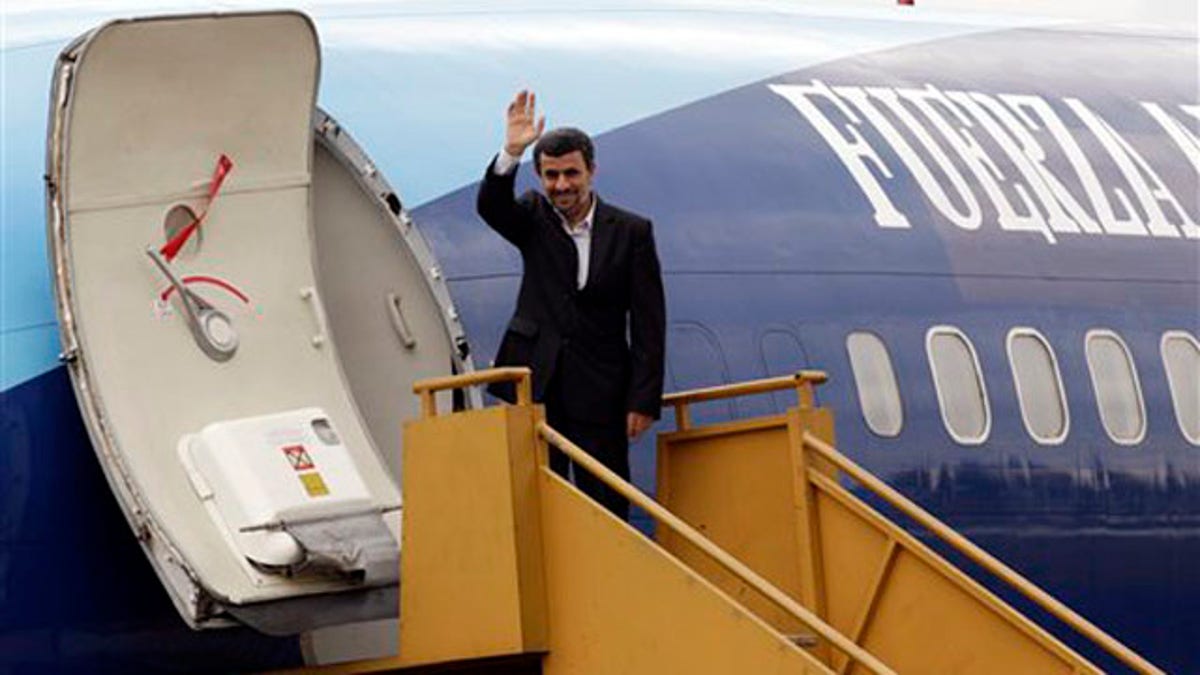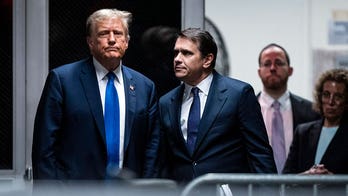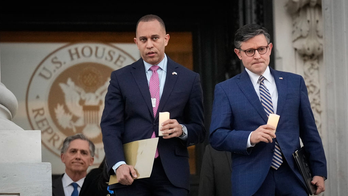
Jan. 13, 2012: Iranian President Mahmoud Ahmadinejad waves to reporters from his airplane at an air base as he departs Quito, Ecuador. (AP)
The Obama administration sent a message to Iran offering to engage the country in direct talks, Fox News confirms -- though a senior U.S. official denied claims that President Obama conveyed that message in a letter.
An Iranian lawmaker first claimed Wednesday that the president floated the proposal for direct talks in a secret letter to the Islamic Republic's supreme leader. The message also warned Tehran against closing the strategic Strait of Hormuz. Iran has threatened to close the waterway, the route for about one-sixth of the global oil flow, because of new U.S. sanctions over its nuclear program.
While the senior U.S. official said no such letter was written by the president or any other top official, Fox News confirms that what was described as a "tough" message was delivered orally through diplomats. The message communicated that closing the Strait of Hormuz would be a "red line" tantamount to an act of war -- it closed with the message that the U.S. continues to be open to direct talks with Iran.
Critics, though, call that a mistake. House Speaker John Boehner said Wednesday that the offer "makes America look weak."
"Talking with the Iranians is playing into their hand. They are masters at fooling the world," said Dan Gillerman, Israel's former representative at the United Nations.
Obama administration officials initially would not confirm whether Obama called for direct talks with Iran. The White House, though, seemed at first to acknowledge that a letter was sent and reiterated that the door remains open for Iran to return to international talks over its nuclear program.
"It remains available to Iran to this day," White House Press Secretary Jay Carney said, adding that the U.S. position "has not changed."
He said the path is open for Iran to "get right with the international community," a move he said would ensure the country has access to nuclear technology for non-military purposes.
"If the Iranians are serious about restarting talks, then they need to respond to that letter," he said. "That is the channel ... by which the restarting of those talks would take place."
Conservative Iranian lawmaker Ali Motahari revealed the content of the message days after the Obama administration said it was warning Iran through public and private channels against any action that threatens the flow of oil from the Persian Gulf.
"In the letter, Obama called for direct talks with Iran," the semiofficial Fars news agency quoted Motahari as saying Wednesday. "The letter also said that closing the Strait of Hormuz is (Washington's) red line."
"The first part of the letter contains threats and the second part contains an offer for dialogue," he added.
Iran's Foreign Ministry spokesman Ramin Mehmanparast confirmed that Tehran received the letter and was considering a possible response.
Defense Secretary Leon Panetta said pursuing diplomacy is "always an option," and that "it takes two to be able to engage."
State Department spokeswoman Victoria Nuland also said the door is open to talks, but added: "We've seen a lot of public statements from Iran that they are interested, but we have not seen the kind of official communications that we need to see that demonstrates serious intent."
As for the specific contents of the message, she said: "No comment except to say ... that we have multiple ways to communicate to Iran, and we deploy them all."
Spokesmen have been vague on what the United States would do about Iran's threat to block the strategic Strait of Hormuz, but military officials have been clear that the U.S. is readying for a possible naval clash.
Iran's Revolutionary Guard, the country's most powerful military force, says Tehran's leadership has decided to order the closure of the oil route if Iran's oil exports are blocked. A senior Guard officer said this month that the decision has been made by Iran's top authorities.
Iranian politicians have made the threat in the past, but this was the strongest statement yet that a closure of the strait is official policy.
Iran's regular army recently held naval war games near the vital waterway that were described by hard-liners as part of preparations to close the strait if sanctions are imposed. The Guard is planning major naval military exercises next month in the same region.
The U.S. last month enacted new sanctions targeting Iran's central bank and its ability to sell petroleum abroad over Tehran's nuclear program. The U.S. has delayed implementing the sanctions for at least six months, worried about sending the price of oil higher at a time when the global economy is struggling.
Closing the strait would have immense world economic impact. Iran is OPEC's second largest oil producer, and oil exports account for 80 percent of Iran's foreign currency income. To Tehran, an oil embargo would be tantamount to a declaration of war that could provoke the Iranian leadership to block the Hormuz strait.
At issue is Iran's nuclear program. The U.S., Israel and others charge that Iran is trying to build nuclear weapons. Their case was bolstered by a report from the International Atomic Energy late last year, citing evidence that Iran was employing methods and equipment used in making bombs.
Iran has consistently denied that, saying its nuclear program is peaceful, aimed at producing electric power and isotopes for cancer treatment.
Fox News' Ed Henry and The Associated Press contributed to this report.




